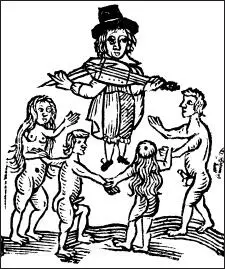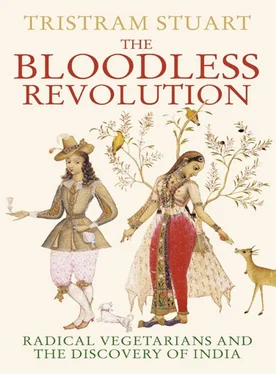1 ...7 8 9 11 12 13 ...47 Ranters and Shakers from The Declaration of John Robins (1651)

A naked rout of Ranters from Strange Newes from Newgate (1650/1)
Naked Adamites from The Adamites Sermon (1641)
The claims Robins and Tany made of biblical descent probably did not seem strange to their contemporaries. Many Puritans had long envisaged the English as a lost tribe of Israel awaiting deliverance from their own Egyptian-style bondage. 15 Thinkers like Jan Amos Comenius aimed to restore man’s lost perfection by converting all the Jews. Ironically, these hopes fuelled the philo-Semitism of the seventeenth century and Robins’ followers were instrumental in a successful campaign to force Parliament to allow Jews to live freely in England. 16 More than a century later William Blake (who dabbled in the Muggletonian cult established by Robins’ ex-followers) was still living in hope: ‘Till we have built Jerusalem,/ In England’s green and pleasant land’. 17
The first Adam had lost Paradise. The second Adam, Christ, had promised to restore everything to its former perfection. John Robins confirmed that he was none other than ‘the third Adam , that must gain that which the first lost’. 18 His followers obediently declared that ‘ John Robins is the same Adam that was in the Garden.’ 19 As John King, another disciple, put it, John Robins ‘is now come to reduce the world to its former condition, as it was before the fall of the first Adam ’. 20
The original Adam lived on the pure fruits of Eden, so it was logical for Robins to insist that his followers should adhere to Paradise’s strict vegetable diet. 21 Thomas Bushell had taken up the vegetable diet to be like Adam before the Fall; John Robins claimed that he was Adam, and vegetable cuisine seems to have been an essential adjunct to his cult. There were other millenarian prophets at the same time proclaiming that the return to the pre-fallen state would require a revival of the original vegetarian diet, like the philo-Semite George Foster who prophesied in 1650 that animals would be involved in the universal freedom which was coming to humans. 22 Like many vegetarians to come, Robins also condemned the use of alcohol: ‘it was not of Gods making: it is the drink of the Beast (said he) a poysonous liquor, and wo be unto all them that drinks it.’ 23 Non-radical contemporaries found Robins’ dietary antics shocking – it was hardly believable that life could be sustained on vegetable food without flesh – but they knew what he was getting at. ‘Their food is onely bread and water, although they have plenty of monies to buy other provisions,’ explained one bemused contemporary, emphasising the Shakers’ asceticism. 24
In a neater and more detailed combination of scatology and eschatology, Robins’ ex-follower and later arch-rival John Reeve condemned his dietary laws to his face: ‘thou didst deceave many People,’ he bellowed, ‘and then gavest them leave to abstain by degrees from all kind of Food, that should have preserved and strengthed their Natures: But thou didst feed them with windy things, as Aples, and other Fruit that was windy; and they drank nothing but Water.’ 25 In the guts of his followers, said Reeve, Robins’ high-blown vegetarian doctrines turned into nothing but malodorous hot air. Most contemporaries agreed: vegetables may have been all right for Adam in Paradise, but they were hardly appropriate for the average earthly being. This common prejudice seemed to be empirically demonstrated by Robins’ experiments. Reeve narrated a woeful tale which, if true, leaves Robins guilty of irresponsibility in the extreme:
he commanded his Disciples to abstain from Meats and Drinks, promising them that they should in a short time be fed with Manna from Heaven, until many a poor Soul was almost starved under his Diet, yea and some were absolutely starved to Death, whose Bodies could not bear his Diet. 26
Reeve squarely identified Robins as a devilish false prophet of the type St Paul had warned would come and deceive the people by ‘Commanding to abstain from meats’ (1 Timothy 4:1–5). 27 Robins wasn’t God, or Adam: he was Satan and he had led many people astray, to their and his own perdition. 28
Unperturbed, Joshuah Garment, Robins’ representative Moses, proudly called their group ‘the people that live by water and bread’. They emphasised that their bloodless diet contrasted to the bloodiness of their oppressors, and combined their vegetarianism with vehement anti-war sentiments and pacifism. Garment denounced his persecutors as ‘bloudy Prelates’ whose ‘Law is Sword’, and predicted that their ‘thirstings after the bloud’ will be punished, for God took no pleasure in ‘those that delight in bloud’. Robins, by contrast, was ‘the peaceable man’ and his followers ‘the peaceable multitude that shall never bear arms offensive or defensive’. 29
These stirring words, with their imagery of blood, bloodthirstiness and bleeding, were a reaction against the violence of the Civil War. Garment, who enlisted as a soldier, witnessed murder and had probably been obliged to kill. His conversion was sudden. One day, after three years of fighting against the King, God personally commanded him to leave the army and effect instead a bloodless revolution ‘by the sword of the spirit, not by the sword of man’. God’s voice ordered him to wait ‘in love and peace, till peace and love is established in the Earth’. 30 Garment became convinced that violence could never achieve his idealistic aims, and his aversion to killing humans and drawing their blood appears to have spread into a repulsion towards bloodletting of all kinds. Universal peace was a prerequisite of Christ’s millennial kingdom as Isaiah had prophesied in the Bible, 31 and this fusion of pacifism and vegetarianism would become a prevalent motif among blood-sated radicals.
The Shakers’ strong repulsion from blood may have been reinforced by their reversion to Jewish law which forbade the eating of blood. To King James I’s amusement, groups of ‘Christian Jews’ earlier in the century had resurrected the Mosaic law, holding that it was ‘absolutely unlawful to eat any swines flesh or blacke puddings’ (i.e. pork or blood). Contemporaries likened the waywardness of the Ranters to the absurdity of the Judaist leader, John Traske, who had been brutally punished in 1618 and starved on a diet of bread and water until he agreed to break his resolve by eating pork. His wife, who was found still languishing in prison in 1639, twenty-one years after her first arrest, obstinately stuck to her scruples. ‘She has not eaten any flesh these seven years, neither drunk anything but water,’ reported an appalled commissioner; but there she remained until at least 1645 when a fellow prisoner at last persuaded her to change her diet. 32
Ridicule from the press and mocking crowds did nothing to sway the Shakers from their course. The strong arm of the law, however, eventually did. By 1650 Parliament had reached the end of its tether with the religious radicals, and in August passed the landmark Blasphemy Act, specifically tailored to suppress John Robins and the Ranters. 33 There was a swift crackdown, and one by one the Ranters were picked off and put behind bars. Several of Robins’ followers were arrested and held in the Gatehouse Prison at Westminster, where they were pumped for information about ‘where John Robins , alias Roberts dwelleth’. Eventually, after almost a year of covert information-gathering, in spring 1651 the authorities caught up with Robins at one of his clandestine meetings in Long Alley in Moorfields and he and his supporters were interrogated and sent to the New Prison at Clerkenwell. 34
Читать дальше













